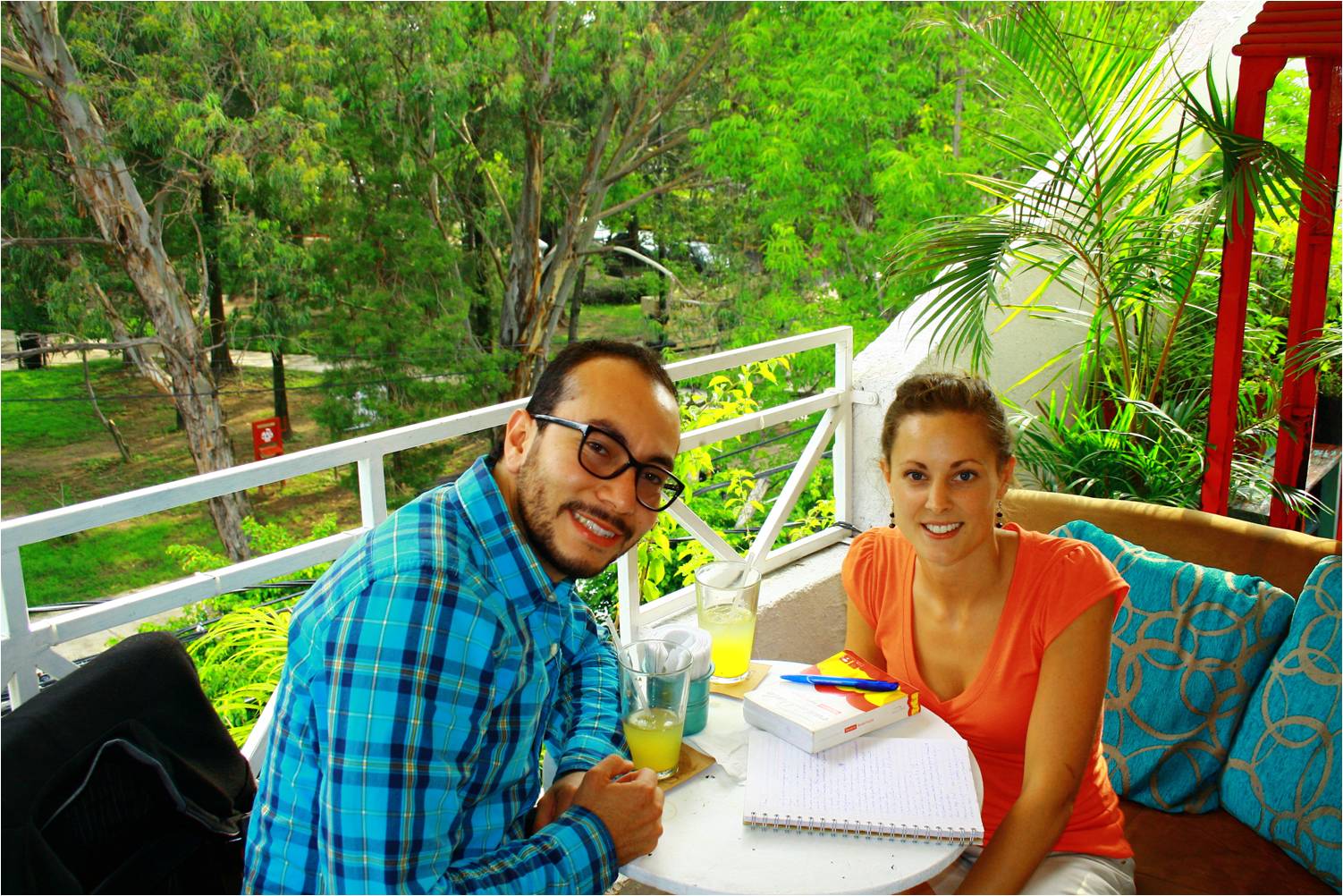It´s the hurdle of shame we need to get over to achieve foreign language fluency. Whatever causes this bizarre feeling of embarrassment, there is only one way to beat it: With real life practice. Ask a native speaker to exchange languages and your shyness will vanish for good.
For more than one year now, I have been meeting up with my *language buddy*. On a weekly basis, we help each other with sharpening our language skills. Jorge, a proud native Mexican, teaches me the ins and outs about Mexican Spanish. I help him improving his English.
It has been a really great experience so far and we are not planning on stopping yet.
Will you ever be done practicing a foreign language?
Obviously any type of foreign language exchange is great to grow confidence and improve conversational abilities. But with the organized tandem learning I am referring to, you can work on this at your own speed. Thanks to the special focus on the language itself, you will get all the support you ask for. For free!
Getting Started with a Language Buddy
There are organizations that arrange face-to-face conversation exchange but with a little extra effort you can easily set up this project independently. Start asking around at language schools, universities, work or on the Internet to find a language exchange partner that matches you well despite language and cultural barriers. The ball will start rolling and an interested language learner will pop up.
The main purpose of language exchange is improving fluency and comprehension. To get the most from tandem language learning you should speak as much as possible. However, when your basic language knowledge isn´t good enough to interact much, you can choose to bring your grammar books and turn the exchange into an informal class. You could also agree on a topic for next meeting so you can prepare yourself at home. Be creative and try out what works for you.
Remind yourself that your progress is your responsibility.
Five Rules to Structure Your Language Exchange
Jorge and I didn´t apply the five rules from the start. They developed as we advanced. It is good to have them though. They give structure to a rather informal meeting where both parties are motivated to progress rapidly. The rules reflect the expectations we have of each other.
Rule #1 – Split Time Fairly
Determine how much time you have for the day and speak half the time in the language you’re learning, and half the time in the language you are teaching. Like this both parties feel equally treated. Use the timer to make sure both get equal practice time.
Rule #2 – Be Proactive
It is your responsibility to ask for explanations when something is not clear and it is your native partner´s duty to correct mistakes and clarify doubts. Taking charge of each other’s learning is the main purpose of this meet up. The both of you are now student and teacher at the same time.
Rule #3 – Take Notes
Be the perfect student and take good notes. Recording corrections and suggestions allows you to repeat them later on which helps you to study better and more quickly. Moreover, note-taking avoids having to ask your partner repeatedly for the same issue.
Rule #4 – Investigate Remaining Doubts
Be the perfect teacher and investigate remaining doubts. Unless you are a linguist, it is quite unlikely that you are able to explain all your partners’ doubts. Research the issue and discuss it next meeting. You will be surprised how much you learn about your own language as well.
Rule #5 – Stick to the Language
Within the time frame, switching the language is not allowed. It is too easy to escape to your native language (or English) when you struggle finding the right words. Unless it is absolutely necessary try to find alternatives first and describe what you want to say.
Five Unexpected Advantages of Your Language Exchange
Provided that both of you are disciplined enough to meet up regularly for a longer period of time, face-to-face language exchange can offer other benefits than foreign and native language enhancement. So far I have noticed the following five advantages.
Advantage #1 – Access to Locals
Language exchange is a great way to build up social contact with natives. When local language skills are poor, it is often tempting to cling to the expat society. A native language buddy can introduce you to friends and family and boost local interaction for you.
Advantage #2 – Cultural Enrichment
As soon as your conversational level allows it, your exchange partner can be your window to his or her native culture. Discussing customs and traditions can turn your conversation exchange into valuable culture classes about the new world you are living in.
Advantage #3 – Extrinsic Motivation
Sometimes it is difficult to find the right motivation to push ourselves through the long process of language learning. Together you can motivate each other by giving frequent feedback and tracking progress. Helping each other makes it more interesting and fun which gives energy to persevere.
Advantage #4 – Neighborhood Exploration
Combine improving language skills and exploring your neighborhood by meeting up in different locations. Random walks for the sake of neighborhood exploration may feel useless after a while. It´s more fun to try out various bars, cafés and parks together.
Advantage #5 – Valuable Friendship
Due to limited language skills it will take longer than normally to build up a friendship. But as your conversation skills grow, conversations get more elaborate. Being forced to talk about anything possible, may develop into a valuable friendship.
Now it’s Your Turn
If you want to be fluent, you have to start practicing. My experience is that the combination of self-study and language exchange gets you fairly quickly to a confident foreign language speaker. Learning a new language is a long term deal so you better enjoy yourself in the process, right? I highly recommend finding a local to work on this project together: it is fun and effective at the same time. Good luck and don´t forget to track your progress; it´s hugely rewarding!
Do you have experience with tandem language exchange?


